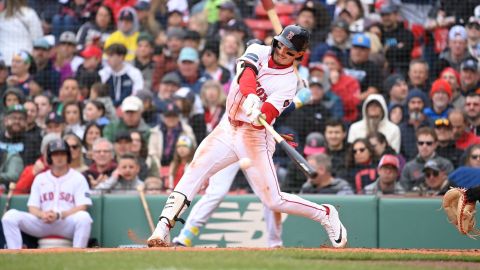Fenway Park is noted as a "friendly" place where families create memories with smiles on their faces. It is coined "America's Most Beloved Ballpark." That sense of merriment rarely applies to visiting teams.
The visiting clubhouse is extremely cramped and conjures up more memories of JV basketball practice than major league dreams. The tunnel to the field is filled with puddles and smells a bit like JV basketball practice. And once on the field, the opposing fans — those smiling families — are never shy about letting one know how they feel.
Add in dimensions as quirky as any in all of sports and you are often left with a home-field advantage unlike any in, um, all of sports.
It is that lack of accommodation and the fact that the Red Sox have always been able to engineer a unit conducive to the surroundings that has made them a top-notch team at home on a consistent basis. Entering 2010, Boston had secured an average of more than 53 wins at Fenway over the previous seven seasons and has a history sprinkled with 50-plus win campaigns at home.
For reasons hard to define, the 2010 edition was virtually the same team at Fenway as it was in every other park, winning just three more home games than road games, the smallest disparity since 2002. The club's 46 victories on Lansdowne Street were its fewest in a season in which it won at least 89 overall since 1939. That history includes a host of 154-game schedules, which of course involve four fewer home games.
Perhaps one such cause was the fact that there was never a strong sense of continuity in the clubhouse. Traditional Red Sox teams have built an aura of invincibility at Fenway, based in large part on a consistent collection of guys brought in to thrive in such an environment. Daniel Nava? Darnell McDonald? Ryan Kalish? Not quite Fenway Park heroes. At least not yet.
For all that those guys did for the club this year, they and their fellow replacements were thrust into a pressure-packed (albeit friendly) setting that may not have jived with their current mindsets.
Terry Francona himself said that the biggest change for rookies and unproven call-ups is not the fact that the pitchers can throw a nasty changeup in a hitter's count but rather the realization that every game, every inning, every pitch is important at the major league level. A bonehead mistake at Triple-A can be part of a player's developmental process. In Fenway, it can lead to two days of headlines and heckles from the hometown fans for another week.
"I think the biggest shock to them is how important every game is to us here," Francona said. "You watch games on TV and you don't realize how intense the dugout is and how much losses hurt us. Guys are used to trying to play the game to get here. When they make a mistake [in the minors] you chalk it up to development. When you make a mistake here you've got to answer for it and we may lose a game in the standings."
Annually, it seems, the Sox have a blazing stretch at home. Too often in 2010 the possibility for such a stretch was cut short when those ill-timed mistakes popped up. Boston was just 13-13 in the final games of series at Fenway, all too often leaving town or entering the next series on a sour note, and went only 36-34 against American League opponents at home.
Boston will be looking for plenty of returns in 2011. Dustin Pedroia, Kevin Youkilis and Jacoby Ellsbury will be returning from injury. Hopefully for the Sox, Josh Beckett, John Lackey and Daisuke Matsuzaka will return from subpar seasons.
A return to form at home would help forge a return to the postseason.



